
Chicago Cubs: Don’t call it a collapse
Though Darvish got injured and Chatwood couldn’t throw strikes, Jon Lester and Kyle Hendricks had good years, as did Cole Hamels after coming over during the season in a trade. The bullpen, for the most part, was excellent. Kris Bryant missed a lot of time due to injury, but Javier Baez had a great year, while Anthony Rizzo did what he usually does. Things were looking good most of the season.
On September 2, after winning 8-1 in Philadelphia, the Cubs were 81-55 and in first place by five games over the Milwaukee Brewers. They only had one scheduled off day after August 20, mainly due to makeup games from rainouts, yet they still managed to go 16-12 in September. The problem? The Brewers, led by Christian Yelich, couldn’t lose down the stretch. They went 19-7 in September, including 4-2 against the Cubs.
More from Cubbies Crib
- Cubs: Adrian Sampson is forcing his way into the conversation
- Projecting the Chicago Cubs bullpen to open the 2023 season
- Cubs fans are beginning to see the light at the end of the tunnel
- Justin Steele has evolved into a frontline starter for the Cubs
- The future of first base is murky right now for the Cubs
The reason the Cubs didn’t play better down the stretch was that the offense suddenly disappeared. After hitting at least .252 as a team every month from April to August, they batted just .235 in September, with a pathetic .663 OPS. The lack of off time didn’t impact the pitchers much, but it may have affected the hitters.
2018 was such a strange year because, as much as went wrong, especially in September and early October, the Cubs still managed to win 95 games. Despite the anemic offense in September, I wouldn’t call it a collapse because, as a team, they still played over .500 while the Brewers just caught fire and were able to catch them.
